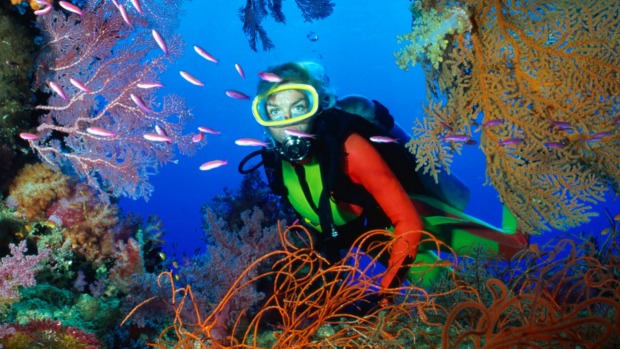
By day, the ocean off Fiji's second-largest island of Vanua Levu is a bright and sun-licked playground, filled with fish whose scales are painted in stripes and swirls and dots of colour. But night comes, sucking the light from the sea and turning it into a dark and inky cauldron.
"Tonight, we snorkel off the jetty," Johnny Singh says.
This is frightening news. The sea is an untrustworthy companion at the best of times, but without the sun's luminescence, how will I protect myself from creatures lurking in the shadows beneath its surface? That is a matter for tonight. Right now, the sun is spilling from the sky, fracturing the water and pinging off the snow-white seabed. Singh, the resident marine biologist at Jean-Michel Cousteau Resort, is tumbling off the side of the boat at Split Rock, just offshore, and into a shoal of sergeant majors. I follow close behind.
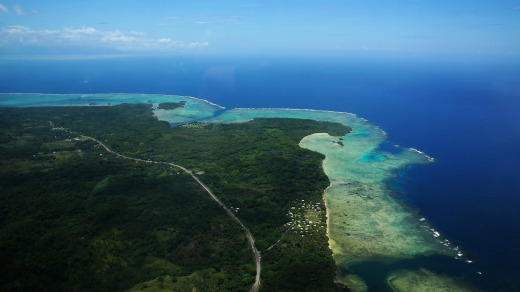
Silence – and those sergeant majors, trembling in unison so that their black-and-white stripes create an optical illusion – engulfs me. A world of grace exists down here, a fairy-tale of golden damsels and electric-blue neon damsels and tomato anemone fish, of spaghetti coral and mushroom-leather coral and magic coral that changes colour when I touch it, of algae colonies called sea pearls and feather stars that dislodge from their resting place on the reef and float soft as a sigh into the palm of my hand.
But it wasn't always this way: less than a decade ago, these tie-dyed waters were bereft of some of their most ecologically-important inhabitants; the locals were fishing them into oblivion, and something had to be done. Pete Yaya, a member of the resort's staff, approached his father, who was spokesman for the village chief. Within a fortnight, the villagers had agreed to the proclamation of a marine reserve around the resort – which, although set on privately-owned land, is closely aligned to the local community.
"[Before], I could count 60 people from here to Split Rock, standing on the beach and fishing," says Yaya. "Now [they're gone and] coral trout, parrot fish – even turtles – come right up to the jetty."
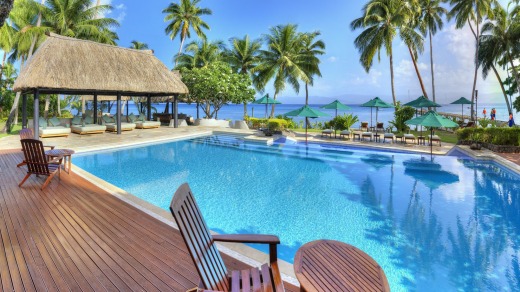
And local fishermen are still in business, for while the resort refuses to serve reef fish or lobster, it pays handsomely for more plentiful pelagic fishes – tuna, mackerel, trevally.
I had observed this lush, turquoise-blotted sea-garden from an entirely different angle on the flight from Nadi on Viti Levu to Vanua Levu's main town of Savusavu. Sitting in the co-pilot's seat beside Luc Delhumeau, the barefooted, French Island Hoppers pilot, I'd counted a hundred different hues and seen rings of coral lying beneath the surface like drowned ruins. He'd pointed out to me the broad, hulking flank of the Sleeping Giant, carved into Viti Levu's highest peak, Mt Evans, the villages sprinkled like confetti into the island's clearings, the shorelines composed of twisted isthmuses and tunnelled inlets and collars of aquamarine bleeding into the dark blue waters beyond the reef. When we landed on the tiny airstrip at Savusavu, the grazing cows had looked up ever so briefly, disinterest glazing their eyes.
A short drive through Savusavu and along its curved wedge of coast had brought me to Jean-Michel Cousteau Resort, cushioned in a forest of red palms and cycads and frangipanis, hibiscus and gardenias and crotons. Constructed in the manner of a Fijian village using traditional building materials, the bures melted back into the foliage so that only the vivid flora and the blue rim of ocean remained.
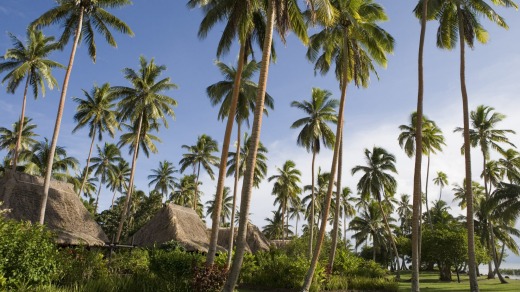
A path led me all the way through this lavish plantation, past the organic vegetable garden crammed with produce destined for the table, past the pond thick with lilies and tilapia and dragonflies living off its nutrient-rich, recycled water, past the ancient rain tree felled by a cyclone and now reimagined as a tree house. At the very end of the path stood a curved wall and, beyond it, with an expanse of beach all to itself, the exclusive Bure Number 25.
Tucked from sight at the far end of the freehold property – which was gifted in a rare gesture by the local chief to the Irishman who had saved him from drowning – the villa was a study in seclusion. Had I stepped onto the beach and turned left, it would be forty minutes before I'd encounter human habitation (in the local village); turning right, I would have come upon the spa bure teetering above the seashore and rows of freshly-planted mangrove saplings.
Instead I sat on a cane chair on the villa's patio, my face turned towards the ocean breeze, while spa specialist Virisine Maroivale bathed my feet in a copper pot filled with coconut milk, scrubbed them with raw sugar and massaged my travel-weary legs. We were the same age, it turned out; we chatted about our children, about her life in the local village on Vanua Levu, my life in the metropolis of Sydney, and her son's life, which was right now being made afresh on the big island of Viti Levu. She'd laughed and said quite simply, "Here is paradise."
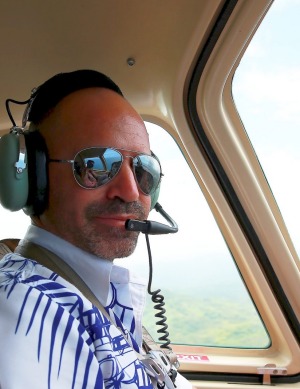
But does paradise disappear when it's swathed in darkness? I ask myself this question now as I stand at the end of the jetty, waterproof torch in hand. Storm clouds have tightened all around us, and the water is discernible only by the speckles of light thrown onto its surface by the adjacent resort. Singh slides into the water and beckons me to follow.
Below the surface, silence enfolds me once more. This morning's bright and expansive sea has turned dark and fathomless; our lights pierce the gloom to reveal an underworld as desolate as a graveyard. Singh swims away from the jetty, prising the reef open with torchlight: over here is a squirrel fish, over there a lion fish. Tucked into a crevice is a parrot fish, fast asleep in a cocoon of mucous which he'll eat his way out of come morning. Pearly cardinals' transparent bodies glow like pearls when we shine our beams upon them. Corals plump up in the darkness, feeding unobserved before retreating into their skeletons come morning.
Singh gestures for me to surface. Our heads bob above the waterline. Rain is dimpling the ocean now, yet we'd had no inkling of it down below.
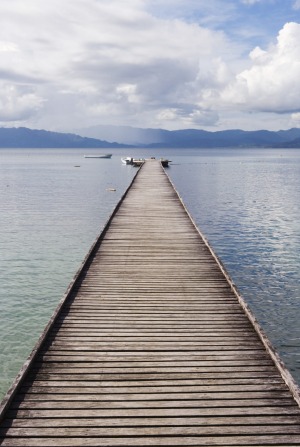
"Switch off your torch," Singh instructs, "go under, shake your hands and see what happens."
I sink back down, extinguish the light and jiggle my hands about in the darkness until a million sparkling pinpricks appear before my eyes. This is bioluminescence, Singh explains later, a phenomenon whereupon agitated zoo plankton is set aflame.
The rain has intensified now and is ripping through the water's surface and stinging our heads. It's time to go, Singh indicates. But I want to stay here, with the fish whose colours have faded as they've fallen asleep and will brighten again at first light; with the nocturnal creatures whose true beauty can only be revealed under cover of darkness; with this zoo plankton, always present but only visible at night-time, glowing in the watery blackness like a sunken milky way.
FIVE OTHER THINGS TO DO IN SAVUSAVU
VISIT SAVUSAVU FARMERS MARKET
Located on Savusavu's main road, the market sells a variety of fresh, locally-sourced produce: tropical fruit and vegetables, crabs, lobsters, yaqona, spices and more. It's open from Monday to Saturday, but things are most festive and range of produce more extensive on a Saturday.
TOUR A PEARL FARM
Pearls have been farmed in Fiji since their introduction by the Japanese in the 1960s, and Savusavu's nutrient-rich bay breeds especially fat and beautifully-hued specimens of these jewels-of-the-sea. Just a short boat ride from the town centre, a window is opened onto this undersea operation. fijipearls.com/farm-tours
WALK THROUGH A RAINFOREST
One of the last unexploited rainforests on Vanua Levu, the Waisali Rainforest Reserve is a protected area and biodiversity conservation project owned by the Waisali community in partnership with the National Trust of Fiji. Close to the beaches yet a million miles away, the reserve is home to a high concentration of endemic species including rare birds and the endangered Fiji ground frog.
CONQUER THE HINTERLAND
Replete with fast-flowing rivers, waterfalls and volcanic hot pools, Vanua Levu's thicketed hinterland offers an adrenalin-spinning alternative to sunbaking on the island's beaches. Adventure packages include mountain biking, hiking, river tubing, kayaking and visits to local villages.
HIT THE WATER
Fiji's watery delights extend beyond the beach and into the bay at Savusavu's Waitui Marina where visitors can take a Polynesian-style paddle in an outrigger canoe under the guidance of the experts. If the wide open ocean is calling, charter a boat and explore undiscovered reefs and dive sites.
MORE INFORMATION
fiji-savusavu.com
GETTING THERE
Fiji Airways flies Sydney to Nadi daily with twice-daily services on Saturdays, Sundays, Wednesdays and Thursdays, from Melbourne to Nadi six times a week with two services on Monday and from Brisbane to Nadi six times a week. See www.fijiairways.com. Island Hoppers offers daily charter flights from Nadi to Savusavu. See helicopters.com.fj
STAYING THERE
Creative Holidays is offering six nights at Jean-Michel Cousteau Resort for the price of four. Priced from $2339 per person including full breakfast, lunch and dinner daily, Savusavu Airport transfers and spa and diving options, the offer is valid for sale until July 15, 2015 and travel from October 4 to December 19, 2015. www.creativeholidays.com